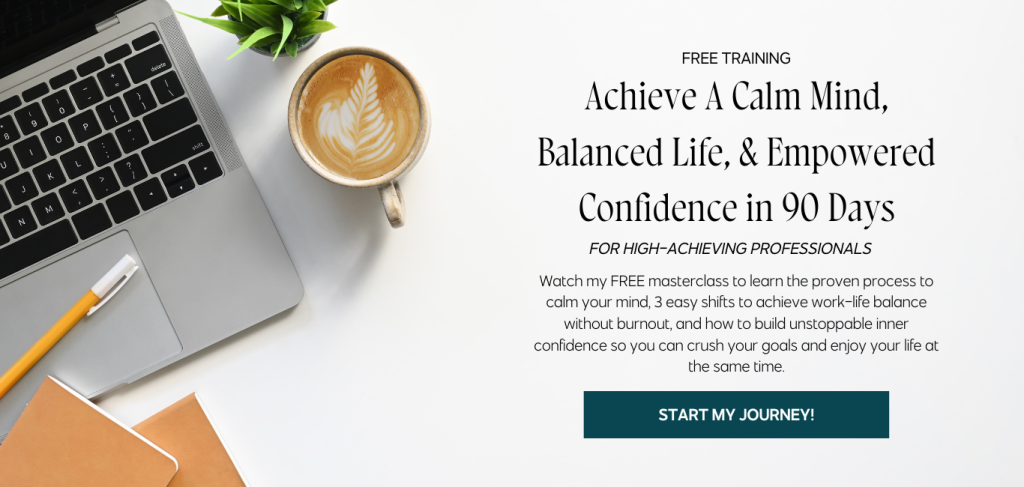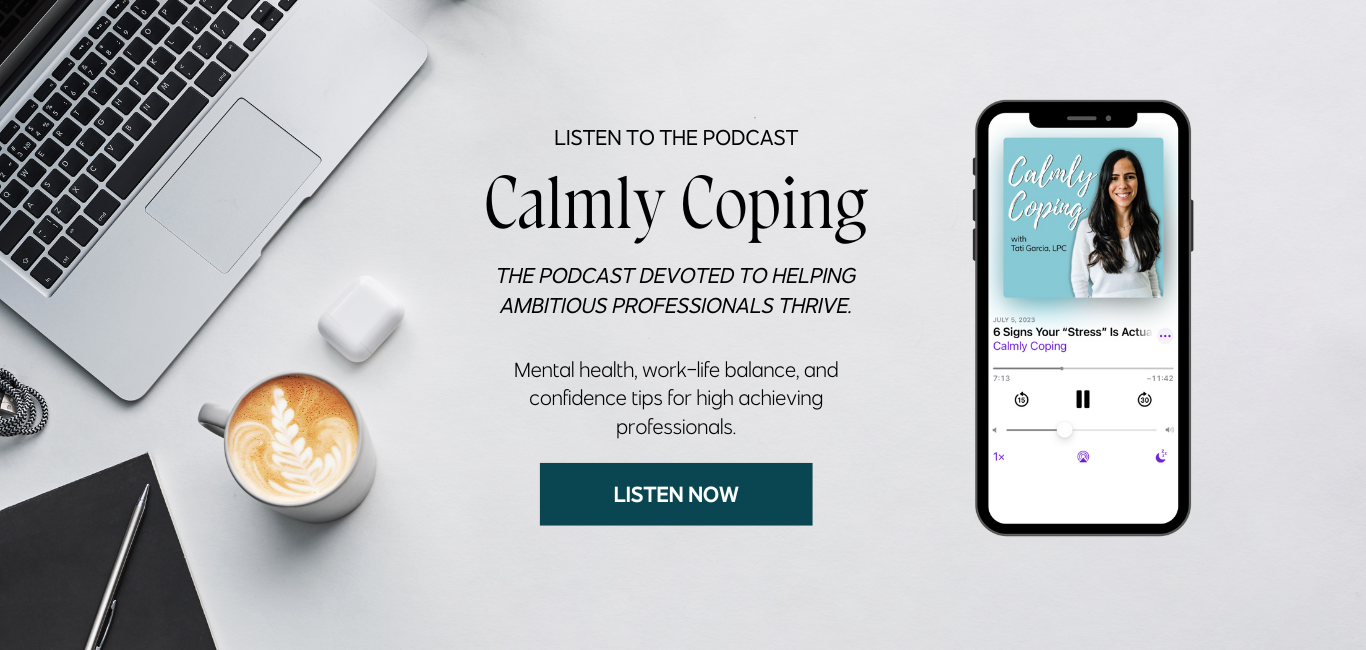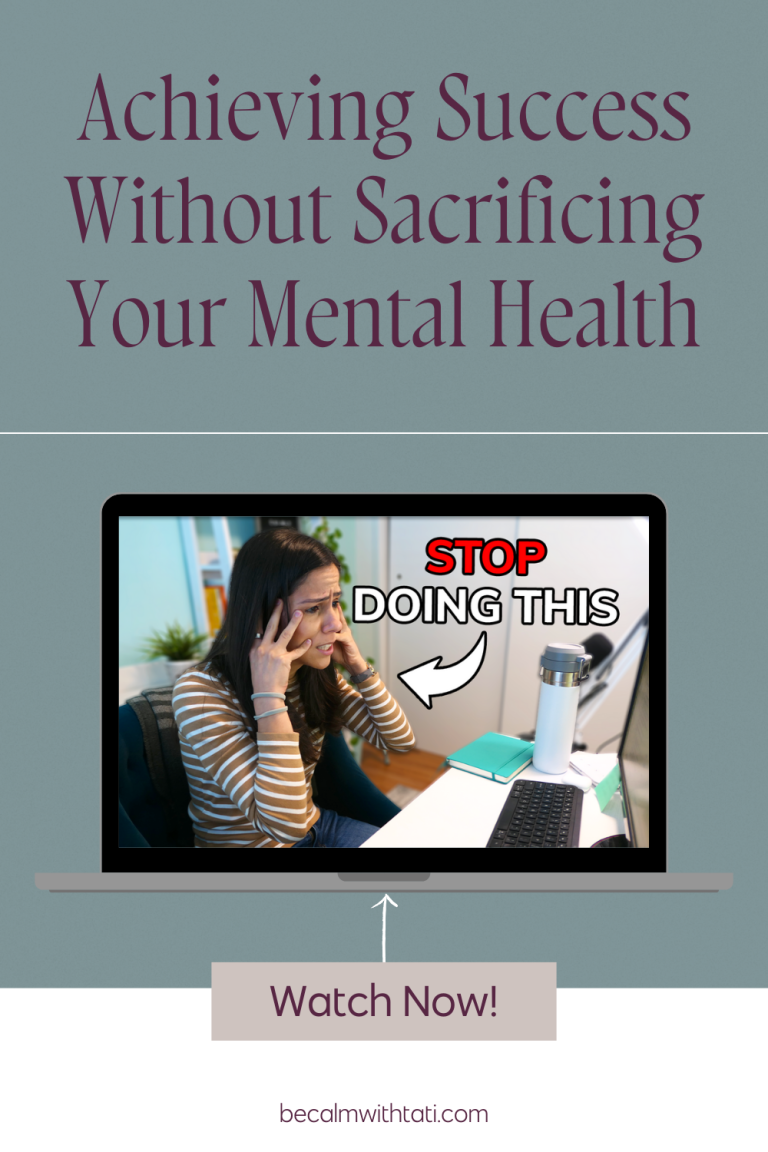Your morning can set the tone for the rest of your day. And when you’re feeling anxious and overwhelmed with life, it can be challenging to make time for a morning routine that helps you care for yourself and feel calm, productive, and present. But it doesn’t have to be that way. Here are my top tips to help you craft an ideal morning routine that fits YOUR life and schedule so you can increase calm and clarity while reducing anxiety and overwhelm, especially when you’re somebody who wants to do it all.
In this episode, you will learn:
- My top tips to create a morning routine that helps reduce both anxiety and overwhelm
- How to feed your mind intentionally in the morning to reduce overwhelm
- Practical tips to create YOUR ideal morning routine, no matter how busy you are
Mentioned in episode:
- Positive Affirmations for Calm, Relaxation, and Confidence: https://www.becalmwithtati.com/positive-affirmations/
- Why Your Need For Control Is Actually A Consequence Of Anxiety: https://www.becalmwithtati.com/control-and-anxiety/
- Create A Calming Daily Routine For High-Functioning Anxiety: https://www.becalmwithtati.com/routine-for-high-functioning-anxiety/
LISTEN NOW:
🎧 CLICK HERE TO LISTEN TO CALMLY COPING WHEREVER YOU LISTEN TO PODCASTS
WATCH NOW:
LEARN MORE ABOUT THE CALM & AMBITIOUS MEMBERSHIP: Be Calm (Use code PODCAST for $15 off your first month/year!)
SUBMIT A MESSAGE, QUESTION, COMMENT OR SUGGESTION TO THE PODCAST: Message
FREE TRAINING: Achieve A Calm Mind, Balanced Life, & Empowered Confidence in 90 Days
If you want to learn how to take back control of your life so you can feel calmer and more confident, and learn the tools to spend your time according to what matters most to you (no matter what your schedule is like right now)…

LISTEN, REVIEW, AND SUBSCRIBE TO THE PODCAST!

INTRO/OUTRO MUSIC: Rescue Me (Instrumental) by Aussens@iter (c) copyright 2018 Licensed under a Creative Commons Attribution (3.0) license. http://dig.ccmixter.org/files/tobias_weber/57990 Ft: Copperhead
DISCLAIMER: All content here is for informational purposes only. This content does not replace the professional judgment of your own mental health provider. Please consult a licensed mental health professional for all individual questions and issues.
Interested in diving deeper to get support for high-functioning anxiety?
I offer 1:1 coaching to help high-achievers overcoming high-functioning anxiety so they can feel calmer, more present, and have improved balance in their lives. Click here if you’re interested in learning more and getting started.
Calm, Balanced, & Confident is my comprehensive A→Z self-paced course to help high-achieving professionals overcome high-functioning anxiety so they can feel calmer, balanced, and more confident without the anxiety and overwhelm. Click here to learn more and enroll today.
Looking for ongoing support and guidance with high-functioning anxiety? The Calm & Ambitious Community is the exclusive community for high achievers with high-functioning anxiety. Click here to learn more and join us today!
TRANSCRIPT:
Click to view the episode transcript.
Your morning can set the tone for the rest of your day. And when you’re feeling anxious and overwhelmed in your life, it can be challenging to make time for a morning routine that helps you to care for yourself and feel more calm, productive, and present. But it doesn’t have to be that way. Here are my top tips to help you craft an ideal morning routine that works for your life and schedule, so you can increase calm and clarity while reducing anxiety and overwhelm, especially when you’re the kind of person who wants to do all the things.
Welcome to Calmly Coping. My name is Tati Garcia, and I’m a licensed therapist and coach specializing in high functioning anxiety. I help high achievers stop putting themselves last so they can feel more calm, balanced, and confident from within. If this topic interests you, then please like, subscribe, and hit the notification bell so you will be notified every time I release a new episode.
Thank you so much for tuning in. First, I want to talk about the benefits of having a routine and some sort of plan when it comes to anxiety and when you’re somebody who experiences anxiety, anxiety thrives on uncertainty and unpredictability. If you think about the things that bring up anxiety, oftentimes it’s those worries about what could happen.
What could go wrong in the future and when it comes to a schedule or routine, it could be, I don’t know what’s coming next. And so I’m thinking about all the possibilities of what could happen or what could go wrong. Maybe being anxious that you’re not going to have enough time for the things that you want to do or the things that you have to do.
And worrying that there’s going to be negative consequences because oftentimes you’re focused on the worst case scenario. The counter to this is having some sort of routine, having some sort of plan. but not going to the extreme end of rigidity. So we look at things as a spectrum. It is on one end having no plan and no routine, on the other end it is having a extreme rigid plan where you need to be in control of what’s happening every single minute of the day.
Now, the problem with that is that when you are somebody who is experiencing anxiety and is uncomfortable with uncertainty, then you can tend to go towards the route of needing to have control. I actually have an entire episode on that, on the idea of, are your problems with needing control actually a consequence of anxiety?
And I will, uh, link that in the corner if you’re watching on YouTube or in the description if you’re listening to the podcast. So when you’re in that place of needing control, what can happen is that when things don’t go according to plan, which is a part of life, it’s a part of being human, then there can be a lot of frustration, even more anxiety and a lot of difficulty as a result of that.
And so that can sometimes make things worse. And so I stand behind the concept of having balance. And balance is being essential. And that middle ground of, you know, in between not having a plan and having a rigid plan is having a plan that is flexible. And I’m going to talk more about that in a little bit, but it is about recognizing that things aren’t always going to go as planned.
And that’s okay. Now another thing is that having a plan can also help you to reduce overwhelm. That’s because you’re being intentional and realistic with what your expectations are rather than piling a million things on that you expect yourself to do. And this is key, this idea of being realistic, and not underestimating the time that something takes because that can be common as humans.
We tend to do that tend to underestimate how long something takes. And then as a result, it can make us feel frustrated and overwhelmed when things take longer. And you can also put too much on your plate. Here are some practical tips to help to reduce overwhelm. I like to look at the concept of reducing inputs.
And by that, I mean, Things that you are taking in, so whether that is content, information, anything related to that, anything that is coming into your mind, whether it’s scrolling through social media, watching a TV show, listening to a podcast, reading a book, having a conversation with somebody where you’re the person who’s primarily listening, all of the things that you’re taking in.
And I want you to imagine that your mind is like a gas tank that you’re filling up. You can only fill up that gas tank so much before it starts overflowing. And then we have a whole other problem where it’s potentially dangerous. If we’re looking at the concept of a gas tank that, you know, having gasoline all over the floor is not, not a good idea.
I don’t know how far I can take this analogy, but essentially our minds can only take in so much information. And it can be really impactful, especially if you are somebody who struggles with anxiety. Maybe you’re more sensitive to certain triggers, things that bring up those sort of negative types of thinking.
Then it can be really powerful to recognize what you’re taking in and to be intentional with what you’re taking in. You can have. too much information, too much coming in and that can result in overwhelm that can also make it harder for you to feel focused. That can make it harder for you to actually process the information that you’re taking in and to make plans.
It can make it harder for you to be productive and to think about things in an objective, clear way. Also, one way to think about what you’re filling your mind with is, is it junk food or is it nutritious? It’s not to say that you need to completely be. black and white and say, all right, I need to completely cut out any form of junk that includes binge watching shows, social media, doing anything for fun, because that is a dull existence.
And we want to again, come back to that concept of balance and seeing how can you have some moderation when it comes to what you’re taking in. If you are constantly taking in junk food, quote unquote, as this kind of comparison with junk content. then it’s not going to sustain your body. It’s not going to sustain your mind.
And it’s the same thing with what we’re taking in. So this is an important precursor before I even get into the morning routine, because these are all concepts to keep in mind when it comes to reducing overwhelm. One example of this could be being present with yourself and maybe even mindfully drinking your cup of tea or coffee as you sit on your front porch or look out your window or be present or journal down your thoughts and emotions or do a short meditation versus waking up and scrolling through TikTok in bed and being bombarded with information overload and hyper consumerism and comparisonitis.
And guilt and feelings of not enoughness because you’re seeing all these people who are posting these extravagant things they’re doing with their lives and then you’re comparing yourself to them and feeling like you’re not doing enough, or you should be doing more, or whatever those thoughts are that come up.
And so, it’s about recognizing how do you want to feel and what do you want to bring into your mind that will help you to feel that way so that you can set that tone for your morning and for your day. If you’re starting off your morning checking your email and then already being bombarded with the requests of others rather than taking care of yourself First and taking that time to nourish your mind and listen to what you need and do what it is that you need to do to care for yourself.
Those are two vastly different starts to your days. And when we start off on the mindset of I need to do things for others, I need to respond to these requests. I need to check social media and see what’s going on. That is a different place than what can I do to care for myself? What can I do to listen to myself?
And of course, this isn’t something that’s always mutually exclusive. For example, if you’re somebody who has children or pets or is a caregiver in some way, there’s not always going to be this perfect. I’m taking this time for myself and then I’m caring for others. However, It is still important, if not even more important for you to take the time to care for yourself, because not only is that allowing you to care for those under your care in a better way and to be more present for them, but you’re also setting a healthy example and modeling for them the importance of self care.
So now that we have those concepts down, the importance of having balance when it comes to making a plan and having some level of expectation and routine, as well as the importance of being aware of what you’re taking in and being intentional with what you’re taking in, let’s talk about the routine. So one thing that I like to follow And I actually heard it put this way recently as having a menu of options rather than a rigid routine of, I need to do my meditation from 8 to 8 15 a.m. And then from 8 15 to 8 45, I’m going to do my three mile run then from 8 40, like whatever, you know, it’s about having a choice. Of multiple things that you can do and not kind of being stuck with I need to do this and if I don’t feel like doing this or if I’m really down or if things don’t work out as planned, then that means that I’m not going to follow through with anything because if you’re somebody who’s high achieving, there could be that tendency to look at things in that way that if you forget to do one thing or if you fall off one day and then it feels like I’ve failed and you’re not Then that can make you feel discouraged and fall off the entire thing.
And we don’t want to set you up for failure. We want to set you up for a realistic life. And sometimes I think things like metric tracking, for example, keeping track of, okay, I’m going to do all of these five habits every day for a week can sometimes be more harmful than helpful. If you are somebody who is high achieving or who has perfectionistic ways of thinking, because that can set you up to when the inevitable happens and you forget a day to then feel really discouraged and to fall off and be really hard on yourself as a result.
So when I talk about having a menu of what it is that you can do for your routine, it’s about deciding, okay, what are a bunch of different options of things that I can do? And Based on how I’m feeling that day, then what can I choose to follow through with? I like to do this, especially when it comes to exercise, because I do enjoy exercise.
I do find it actually extremely beneficial for my mental health. And. And at the same time, I’m not always in the mood to go for a run or do something super active or do different types of exercise. Maybe I’m not always in the mood to do a complete kind of strength training routine. So I like to give myself options.
So let’s say if I’m not in the mood to do what I had already planned, then maybe instead I’ll do a yoga practice or I’ll go for a walk or go for a longer walk instead of a run. Whatever it is. being flexible with what it is that I am doing in combination with listening to myself. Now, there is a line here as well.
If you’re somebody who tends to struggle with depression, so maybe you have trouble with getting motivated, trouble with sticking to things, you might never feel like exercising or doing the things that can help you feel better. And so if that’s the case, then it of course can help to speak to a mental health professional.
And also recognize that taking these smaller steps can be helpful to help you get motivated. So even if you don’t feel like doing anything, telling yourself, okay, I’m going to do five or 10 minutes of the exercise that I had planned and starting small and building up from there. One thing that can be helpful outside of the menu of options is to identify what your non negotiables are.
So what are the things that you know are necessary and important for you to take care of yourself, to keep care of your mind, your body, your physical and mental health. So that can look like getting enough sleep. This one in and of itself is getting enough sleep. super impactful. This one in and of itself can be super impactful.
And so I highly suggest just starting with this. If you find that you’re consistently sleep deprived, just focus on getting more sleep, getting enough sleep. And this can also look like exercise. Like I mentioned, having a nutritious meal that keeps you full rather than kind of in the ups and downs of getting hangry.
And then, you know, Feeling tired and whatever else can happen if we’re not eating nutritious food. And of course, that’s going to look different for everybody. I’m not a nutritionist. So find what works best for you and also things to take care of your mental and emotional health. Finding again, what works best for you.
Maybe that is meditation. I just talked about that in my previous podcast episode. Maybe that is journaling and just writing down how you’re feeling. Maybe that is just. Making an intentional plan to help you to reduce those feelings of anxiety and overwhelm so for your day And you can also do simple things like recite positive affirmations daily.
I have two separate podcast episodes on affirmations I’m going to link in the corner if you’re watching on YouTube to a video to help you recite affirmations for calm confidence and relaxation. That is a video. I think it’s only about eight minutes. That is a simple practice that you can do to set yourself up for a positive mindset.
Maybe it is visualizing a positive day ahead, closing your eyes and imagining going through your day. What would that look like if it’s a successful day? Maybe it is going for a walk without inputs. So just going outside, enjoying the sunlight, and If it is sunny, of course, and just enjoying the weather and enjoying the outdoors, it’s not about finding this perfect plan.
Like I’ve seen these things that say the science back, it’s best morning routine. The reality is that there can be things that are supported by science, but at the end of the day, we are all unique individuals and it’s about. binding what works best for you. And one morning routine that worked for you at one point in your life may not work for you at a different point.
So not only are we all unique individuals, but our lives, our priorities, our preferences also change throughout our lives. And so that’s when it can help to build this muscle of being self compassionate. And understanding that things aren’t always going to go according to plan and connecting with how can I care for myself today in no matter what way that looks like.
And also being flexible and recognizing that it’s okay if you don’t exercise five days this week, or if you don’t do your. affirmations every single day. It’s about being consistent in the way that works best for you and finding what works best for you. I know that this isn’t necessarily a prescriptive thing, but I’m encouraging you to listen to yourself and to try things out.
Sometimes when you’re first starting, it can help to a clearer plan and finding what works best for you. But then as time goes on, you might build that muscle more of listening to yourself and being there for yourself. And I like to describe this as having kind of like a bear routine. So what are the non negotiables of whether I have barely any time in the morning and I have a busy day.
What do I want to really prioritize versus an ideal morning routine? So maybe on the weekends, or maybe if you have a longer morning, what would you like to do on those days? And so what I have actually, this is something that I’ve shared with my community members and the common ambitious community is that I have them identify what’s your bear morning routine and non negotiables and what’s your ideal morning routine.
And you can use these as kind of jumping off points to help you to select. What’s going on today? Did I sleep in and maybe I’m just focusing on the non negotiables versus the ideal routine of I want to take it slow, and I want to really enjoy my morning. There is no perfect routine. Again, I’ve probably said this a million times, but it’s about finding what works best for you, asking yourself what you need, and being flexible that things won’t always work out as planned.
And especially if there are other people involved, whether it’s people, animals, children, whatever, things happen. Not to say that. That children aren’t people, but just to specify could be children as well. Those are my thoughts on creating an ideal morning routine for you. If you’re struggling with anxiety and or overwhelm, I’d love to hear your thoughts in the comments below.
So leave me a comment with what your favorite activity is to do during your morning routine. And like I mentioned before, if you’re looking for guidance on creating your ideal daily routines, a morning routine, an evening routine, how to take productive breaks, I have an entire training on this in my Membership Community for High Functioning Anxiety, the Calm and Ambitious Community. When you join, you’ll also get access to monthly group coaching calls, community support, and monthly planning workshops to help you gain clarity and confidence. You can learn more by going to calmandambitious.com or clicking on the link in the description.
And if you have a message, comment, or suggestion for the podcast, you can leave me your message at calmlycoping.com/message. While you wait for next week’s episode, I have other episodes on calming your mind, increasing work life balance, and. feeling more confident from within. So you can check out these episodes here.
Thank you so much for tuning in today and until next time, be calm.


Until next time…













